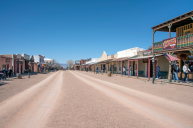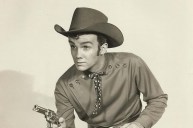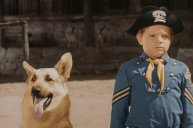Audie Leon Murphy, one of the most decorated American soldiers in U.S. history, was born in the small Texas town of Kingston to Emmett Berry Murphy and his wife Josie Bell Killian in 1925. Audie was the seventh of twelve children in his sharecropper family.
From a young age, Audie Murphy's life was tough. His father drifted in and out of the family's lives before finally abandoning them altogether. When Audie was 16, his mother died. The boy worked several odd jobs to help support his family, including picking cotton. Audie also became skilled with a rifle, hunting small game like rabbits to help feed his impoverished family.
When the United States entered World War II after Pearl Harbor, a teenaged Audie lied about his age and attempted to join the Army, Navy, the Marine Corps — anyone who would take him. But he was rejected from all of them for being underweight. Eventually, Audie was able to lie his way into the U.S. Army with the help of his sister. Murphy was initially deployed to North Africa before participating in the Invasion of Sicily. He fought through Italy against both Italian and German forces and was twice hospitalized with Malaria during his time in Italy, but ultimately he participated in the liberation of Rome. Murphy was awarded the Bronze Star and a Bronze Oak Leaf Cluster for his Bronze Star.
After Italy, Murphy fought in the invasion of Southern France. Having now reached the rank of platoon sergeant, it was in France where Murphy would become an Army legend and win his Medal of Honor. Murphy distinguished himself again and again in battle, but it was his action in the Colmar Pocket for which he is best known.
Having now been promoted to the commander of Platoon B, Murphy ordered his men back into covered positions in the woods after Germans knocked out an M10 tank destroyer as they attacked. Alone and wounded, Murphy returned fire on the advancing Germans, first with his M1 Carbine and then with the .50 caliber machine gun on top of the destroyed and burning tank destroyer. Murphy also directed artillery fire against the attacking Germans with his radio. Murphy ultimately killed or wounded 50 German soldiers during the counterattack and only stopped when he ran out of ammunition. Murphy was injured in the leg during his stand.
Read More: 'Gunsmoke' Co-Star Ken Curtis Also Found Success in Western Films, Country Music
All in all, Murphy received the following awards for his service during World War II:
The Medal of Honor, the Distinguished Service Cross, the Silver Star with bronze oak leaf cluster, the Legion of Merit, the Bronze Star with "V" Device and bronze oak leaf cluster, the Purple Heart with two bronze oak leaf clusters (technically three awards), the Presidential Unit Citation with First Oak Leaf Cluster, Good Conduct Medal, American Campaign Medal, European-African-Middle Eastern Campaign Medal with one silver star (counts as five medals), four bronze stars, and one bronze arrowhead device, World War II Victory Medal, Army of Occupation Medal with Germany Clasp, Armed Forces Reserve Medal, Combat Infantryman Badge, Marksman Badge with Rifle Component Bar, Expert Badge with Bayonet Component Bar, French Legion of Honor - Grade of Chevalier (Knight), French Croix de Guerre with Silver Star, French Croix de Guerre with Palm, Medal of a liberated France, the Croix de Guerre with 1940 Palm from Belgium, and French Fourragère in Colors of the Croix de Guerre.
Murphy was given a battlefield commission to First Lieutenant and eventually reached the rank of Major. His military career alone was enough to make him famous, but he was only just getting started. Hollywood was calling, specifically in the form of iconic actor James Cagney, who saw an article about Murphy in Life Magazine and invited the soldier to sign as a contract player in his production company. Murphy was given acting lessons and voice lessons. Murphy never made a movie with Cagney, but he was officially in Tinsel Town now.
In 1949, Murphy published his war memoir,To Hell and Back. He also landed his first leading role in the film Bad Boy. The war hero turned movie star would go on to work with director John Huston, starring in the Civil War film The Red Badge of Courage and The Unforgiven. Murphy's biggest film, though, would be the one in which he played himself. In 1955 the film adaptation of To Hell and Back became Universal's biggest hit ever at the time.
Life was not all fun and glamour for Murphy, however. The veteran had Post Traumatic Stress Disorder and became dependent on sleeping pills. Though his acting career was thriving, Murphy was never really at peace, sleeping with a loaded pistol under his pillow most nights.
On May 28th, 1971, Audie Murphy was killed when the private plane on which he was a passenger crashed into Brush Mountain, near Catawba, Virginia. There were no survivors. Murphy was buried at Arlington National Cemetery with full military honors. His grave is still one of the most visited at the cemetery to this day.
This article was originally published in June of 2020.
Now Watch:
https://rumble.com/embed/u7gve.cc4f1v/




